When we came to Alexandria, a city of Egypt, I, longing for novelty (as a thirsty man longs for fresh water) departed from these places as being well known to all, and, entering the Nile, arrived at Cairo.
In The Travels of Ludovico de Varthema, 1863. Translated by John Winter Jones. Ed. Hakluyt Society, London. p.5
After my previous post where I tried to clarify some basic issues related to Ludovico de Varthema and his book, Itinerario de Ludovico de Varthema, it's time to actually ding into what matters: who was this man and why is his book so interesting. Varthema's basic life and travel facts are easily retrieved. But what else can we collect from his writings?
Ludovico de Varthema and his Itinerario
Varthema was an aristocrat in is early thirties, probably bored, craving for experiences and excitement. His writings show the care of an educated man: knowledge about religion and mythology, with occasional reference to biblical scenes and places. He was accustomed to commodities, such as perfumes or spices, to which he refers often, when comparing products' quality, aspect or smell.
He is objective and mostly neutral in his remarks, naturally filtered by the typical late-medieval Christian superstitious view.
You must know that, in my opinion, the curse of God has been laid upon the said city (Mecca), for the country produces neither grass nor trees, nor any one thing.
idem, p. 37
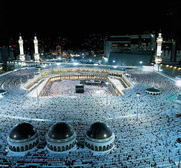
He is a sharp observer with a keen sense of space, fairly describing buildings' dimensions and area. He is often humorous and many episodes prove him as being an intrepid and brave, though cautious, adventurer.
Even though his intellectual world has a strong religious presence and consequent religion/race sub-divisions: pagan, Muslims, things of the devil, etc., he shows respect for the people he meets the and events he witnesses, referring to his observations in a humble way:
Even though his intellectual world has a strong religious presence and consequent religion/race sub-divisions: pagan, Muslims, things of the devil, etc., he shows respect for the people he meets the and events he witnesses, referring to his observations in a humble way:
I have to lay before every kind reader matters of greater importance and comfort to the intellect, and of courage, so far as our favourite labour of travelling through the world may assist us and our intelligence may serve us, submitting, however, everything to the judgment of men who may, perhaps, have visited more countries than I have.
idem, p. 135
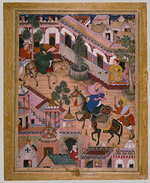
His descriptions of battles and cultural habits are dramatic, and the inclusion of phonetically transcribed dialogues and several stories of love-related subjects, usually depicting exquisite marital habits or sex-related practices, give his account an even deeper, more human, content.
He is integer and critical, and his thoughts and reflections are shortly presented. Extremely curious, he talks to the merchants, to the street people, to his hosts. In a gently poetic way, he also vividly describes emotional states, colours, smells, activities and even air quality:
He is integer and critical, and his thoughts and reflections are shortly presented. Extremely curious, he talks to the merchants, to the street people, to his hosts. In a gently poetic way, he also vividly describes emotional states, colours, smells, activities and even air quality:
"the odours which are smelt within this temple appear like a spicery full of musk, and of other most delicious odours." - p. 201.
Some passages of his account make it hard to say whether he's fantasising, exaggerating or in fact experiencing extraordinary events. It is somewhat unclear sometimes if he visited all the places he describes or if he inquired people about them.
Veracity of some episodes, dialogues and their phonetic transcriptions is very arguable. Nevertheless, in the overall his narrative seems reliable: "his summary account of the people and government is surprisingly accurate" even though parts of his narrative are undoubtedly "tinged with borrowed fable" (idem, editor's preface)
Veracity of some episodes, dialogues and their phonetic transcriptions is very arguable. Nevertheless, in the overall his narrative seems reliable: "his summary account of the people and government is surprisingly accurate" even though parts of his narrative are undoubtedly "tinged with borrowed fable" (idem, editor's preface)
It is impossible to peruse Varthema's narrative and not feel a conviction that the writer is telling the truth, that he is recording events which actually took place, and describing men, countries and scenes which he had examined with his own eyes. There is a manifest absence of all attempt at composition. The tale is told with a charming simplicity (...)
idem, Translator's preface
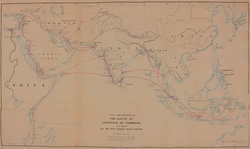
Exotic places and events
Apparently, Varthema didn't have a travel plan. He crossed the Mediterranean to Egypt, then Syria, Saudi Arabia and Yemen, India, Iran, Uzbekistan, Thailand, Indonesia, Tanzania, Mozambique. From here, a maritime return trip to Lisbon, with a pit-stop at the Azores. I built a summarised map of his journey, (check the full-size map and listed locations).
On the account of this map, the overall distance is roughly calculated in more than 60.000 km - an average of 1km/h, for seven years (2555 days). Now, this is either impressive or the places catalogued aren't entirely liable. Anyone willing to go deeper on the subject, please let me know.
Apparently, Varthema didn't have a travel plan. He crossed the Mediterranean to Egypt, then Syria, Saudi Arabia and Yemen, India, Iran, Uzbekistan, Thailand, Indonesia, Tanzania, Mozambique. From here, a maritime return trip to Lisbon, with a pit-stop at the Azores. I built a summarised map of his journey, (check the full-size map and listed locations).
On the account of this map, the overall distance is roughly calculated in more than 60.000 km - an average of 1km/h, for seven years (2555 days). Now, this is either impressive or the places catalogued aren't entirely liable. Anyone willing to go deeper on the subject, please let me know.
Hot stories
The Itinerario includes detailed descriptions of extraordinary cultural habits of which Indian sati or widow burning is a remarkable example: widowed women willing or being forced to being burned alive in their late husbands' cremation. Even though prohibited by the British in 1829 this practice is documented as late as 1999. Jules Verne's "Around the world in 80 days", in one of its most acclaimed episodes, the rescue of Aouda, centres on this tenebrous practice - here poorly depicted in a 1989 mini-series with a shallow, unconvincing, Pierce Brosnan as Philleas Fogg:
The Itinerario includes detailed descriptions of extraordinary cultural habits of which Indian sati or widow burning is a remarkable example: widowed women willing or being forced to being burned alive in their late husbands' cremation. Even though prohibited by the British in 1829 this practice is documented as late as 1999. Jules Verne's "Around the world in 80 days", in one of its most acclaimed episodes, the rescue of Aouda, centres on this tenebrous practice - here poorly depicted in a 1989 mini-series with a shallow, unconvincing, Pierce Brosnan as Philleas Fogg:
Most stories depicted in Itinerario have suggestive titles, that speak for themselves:
THE CHAPTER CONCERNING THE CEREMONIES WHICH THEY PERFORM AFTER THE DEATH OF THE KING.
THE CHAPTER SHOWING HOW THE PAGANS SOMETIMES EXCHANGE THEIR WIVES
THE CHAPTER SHOWING HOW THE POLIARI AND HIRAVA FEED THEIR CHILDREN
THE CHAPTER SHOWING HOW THE KING CAUSES HIS WIFE TO BE DEFLOWERED
THE CHAPTER SHOWING HOW THE WIFE IS BURNT ALIVE AFTER THE DEATH OF HER HUSBAND
THE CHAPTER CONCERNING THE ASSAULT OF THE PORTUGUESE UPON PANNANI
> Visit the page with a few extracts from Varthema's texts
Bon voyage!
THE CHAPTER CONCERNING THE CEREMONIES WHICH THEY PERFORM AFTER THE DEATH OF THE KING.
THE CHAPTER SHOWING HOW THE PAGANS SOMETIMES EXCHANGE THEIR WIVES
THE CHAPTER SHOWING HOW THE POLIARI AND HIRAVA FEED THEIR CHILDREN
THE CHAPTER SHOWING HOW THE KING CAUSES HIS WIFE TO BE DEFLOWERED
THE CHAPTER SHOWING HOW THE WIFE IS BURNT ALIVE AFTER THE DEATH OF HER HUSBAND
THE CHAPTER CONCERNING THE ASSAULT OF THE PORTUGUESE UPON PANNANI
> Visit the page with a few extracts from Varthema's texts
Bon voyage!
I determined, personally, and with my own eyes, to endeavour to ascertain the situations of places, the qualities of peoples, the diversities of animals, the varieties of the fruit-bearing and odoriferous trees of Egypt, Syria, Arabia Deserta and Felix, Persia, India and Ethiopia, remembering well that the testimony of one eye-witness is worth more than ten heard-says.
Idem, p. 2
More than 500 years have passed since Ludovico de Varthema endured his fascinating journey - he probably never thought how inspiring and lively his accounts would seem to the posteriority.
With the increasing dependance on portable digital devices such as smartphones, GPS, etc., the decay in travel guidebooks sales shows that the modern globalised era definitely imposes different ways of travelling and sharing your experiences - often behind a light screen.
The scents of musk and spices, the fresh air of virgin mountains and the busy sounds of the colourful markets are but a vague impression, in a world dominated by the eye and the ear. I wonder which moor princesses are still willing to be rescued by such boring heroes...
Text by Rafael Fraga © 2013
rafaelfragamusic |at| gmail.com
With the increasing dependance on portable digital devices such as smartphones, GPS, etc., the decay in travel guidebooks sales shows that the modern globalised era definitely imposes different ways of travelling and sharing your experiences - often behind a light screen.
The scents of musk and spices, the fresh air of virgin mountains and the busy sounds of the colourful markets are but a vague impression, in a world dominated by the eye and the ear. I wonder which moor princesses are still willing to be rescued by such boring heroes...
Text by Rafael Fraga © 2013
rafaelfragamusic |at| gmail.com
Please share your opinion, insights and critics with us, commenting below. We'd love to hear from you! Thanks!
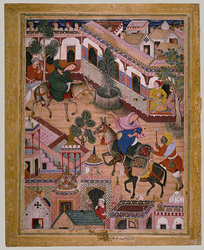
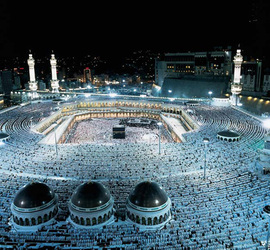
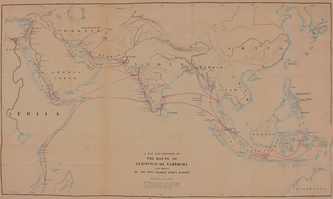
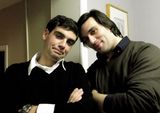
 RSS Feed
RSS Feed
